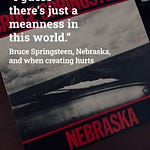A couple of years ago, I went to see a band with some Christian friends. During their set, the band covered U2’s “I Still Haven’t Found What I’m Looking For.” U2 is my favorite band, so the minute I realized what they were playing, I started singing along like it was karaoke night in grad school.
My friends must have thought I was insane because when the song ended, one of them said, “Kori . . . what the huh? That song sounds like it’s about a guy who has lost faith in God.”
I didn’t say anything at first. Mainly because I was tempering my hair-trigger impulse to defend my favorite Irish boys. Then, I told her I understood her concern and explained more about the lyrics.
The protagonist of “I Still Haven’t Found What I’m Looking For” is standing in the uncomfortable place between faith in the coming of Christ to make all things right and still wanting to find meaning in this fallen world.
Whether believers want to admit it or not, we have all been there.
My friend accepted my explanation, and we had a great time. But for a moment, it took me back to that place I described last week, of feeling like I needed to offer an explanation of how the art I love fits with my faith.
I also experienced similar emotions on another occasion, although the circumstances were very different. I had posted on Goodreads that I was reading a Bible commentary by a modern-day pastor and author when I received a text from a Christian friend who is also a writer. “How can you read that?” the message said. “Do you know what a hot mess that guy is?” She then explained what she meant by this.1
I wrote back that I appreciated her sharing the information, but I was looking for excellent biblical scholarship, and this commentary fit the bill. In all honesty, I get it. There are some Bible teachers whose work I love to read in print but whose sermons, for various reasons, are hard for me to listen to.
I think she understood, but it struck me as interesting that I had to defend my choice of Bible teachers when I was used to defending things like my film or musical tastes.
These two stories sum up what it often feels like for me as an orthodox believer as well as an artist who loves all forms of creativity. Among other Christians who see God’s Word as the highest authority, I’ve been regarded with suspicion for being “too liberal.” Meanwhile, I’ve been in many spaces in various arts communities, Christian ones included, where I’ve been seen as “too religious” or “too conservative.” In reality, neither of these assumptions fully honors who I am as a believer.
It’s a weird place to sit.
Makoto Fujimura, one of my favorite artists and writers, has a term for this experience. He employs the Anglo-Saxon word mearcstapa, which translates “border walker” and describes a person in early tribal cultures who moved between communities, bringing back stories and news to the different groups.
This person never quite fit with any of these communities but helped them see other perspectives and was able to empathize with multiple groups of people.
When I first read Culture Care, the book in which Fujimura addresses this concept, I felt like it explained why I frequently felt isolated and uncomfortable even in groups where I was among family in an artistic and spiritual sense. It was comforting. It was okay to belong and yet not belong.
The idea of mearcstapa is beautiful. It describes a role that is desperately needed in a time of hostility, division, and cultural conflict. Truthfully, all Christians should occupy this position as we seek to be salt and light in the world while awaiting our Lord’s glorious return.
It’s just that recently, I’ve changed my thinking about how I relate to this idea.
At our church, we’ve been studying unity in the body of Christ, particularly Romans 12 and 1 Corinthians 12-13. As I’ve considered this topic, one passage has stuck out to me:
“For as in one body we have many members and the members do not all have the same function, so we, though many, are one body in Christ, and individually members one of another. Having gifts that differ according to the grace given to us, let us use them.” (Romans 12:4-6)
All Christians, through the Holy Spirit, have been placed in the body of Christ to perform the good works God has prepared for them, using their spiritual gifts for the benefit of the church.
No two believers are alike—our individual stories and abilities, according to His grace, have been carefully designed to fulfill a role in the church created just for us.
That means that wherever we are and whatever we do in His Name fits perfectly into the body. There are no rough edges or choppy corners. As Peter later writes:
“You yourselves like living stones are being built up as a spiritual house, to be a holy priesthood, to offer spiritual sacrifices acceptable to God through Jesus Christ” (1 Peter 2:5).
Here’s my point: if I am carefully designed to serve a specific function in the church by God’s sovereign and gracious will, then I fully belong to the Body of Christ.
I can’t divide my identity into the “Christian part” and the “artsy part.” The Lord desires His Bride to be not just unified but diverse; as I heard one speaker say at a conference this year, “We are not called to sameness, but oneness.”
But that isn’t possible unless we recognize that our whole lives as individuals must also be unified.
I can’t leave my doctrinal convictions behind when I spend time with artists who hold different views. Similarly, I can’t check my art at the door when I go to church.
True integrity comes from being a whole person, not just a combination of parts we can turn on and off when it’s convenient. The Spirit of God makes this possible for each of us individually as well as the many members of one body.
I don’t want to be on the edges of my communities. I want to be fully immersed in my role as a member of the body, wherever I am.
This will always create tension. It will always lead to uncomfortable conversations. But it’s part of allowing iron to sharpen iron as God uses us as tools for each other’s sanctification.
If it sounds like I want to throw the mearcstapa baby out with the bathwater, please don’t think that. God’s Word has just challenged me of late to stop seeing myself as some kind of Christian misfit who can never fully belong to any of the circles I’m part of and instead embrace my perfectly crafted function as a believer with a unique mission.
There’s a lot more to this story, and if you read my forthcoming book, Why I Dyed My Hair Purple & Other Unorthodox Stories, you’ll see what I mean.
But for now . . . what are your thoughts on this?
Have you ever struggled with feeling like you don’t belong? Have you experienced this tension of being misunderstood among different circles in your sphere? Drop any thoughts you have in the comments.
Also, a while back, I made a mearcstapa t-shirt, and you can buy it on the Redbubble store I have that I never talk about.
The exact details of this conversation haven’t been included because they don’t matter, but I want to note that they did not involve issues of doctrine or questions about whether I was following a false teacher. In cases where believers are following teachers who are undisputedly heretical, we have a responsibility to warn each other and protect each other from false doctrine.












